Steven (50s)
Interview conducted remotely aboard the R Heritage Too
Everyday I try to get off the boat and stretch my legs to take a walk somewhere. As I leave the dock I peer in the water. Yesterday for the first time I noticed some tiny fish I had not seen before. Pipefish or filefish I thought to myself but they turned out to be Snipefish (Macroramphosus scolopax). I learned this from contacting Les Gallagher, a local fish expert and the talented illustrator of FishPics who I interviewed last November in Horta. Apparently, these fish have been showing up in abundance the last few years. Today I got a much closer look as hundreds of these seahorse relatives had found their final resting place together, likely trapped someplace fish should not be by the strong overnight winds and large tide swings induced by the full moon. 
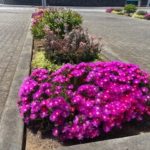 The death of so many of these interesting fish is sad, but a few hundred feet later I was delighted by a bright explosion of color of an ice plant in peak bloom. The world is in a constant balance between life and death. It is an important lesson during these times.
The death of so many of these interesting fish is sad, but a few hundred feet later I was delighted by a bright explosion of color of an ice plant in peak bloom. The world is in a constant balance between life and death. It is an important lesson during these times.
My lessons these days come not only from the earth but from individuals. Judy, the captain’s wife, is a generous woman and one of her goals last fall seemed to be to teach me the importance of giving. She spent much of her time in the communities we visited seeking out people in need and finding ways to help. Captain Bruce also is a giving individual and is active in “The Friends of Ile a Vache Haiti” non profit organization. When Ari, who I interviewed a few weeks ago, learned about this program, she mentioned that her friend Steven was involved in a similar effort and that it was having a positive impact on communities around the world.
Steven works at the Asian Rural Institute and is the coauthor of a book entitled “Rural Leaders. The Work and Community Impact of Graduates of the Asian Rural Institute.” When I first asked Steven for an interview he casually mentioned that the Asian Rural Institute was named after my friend Ari. Before this interview I believed him, she is a pretty remarkable person, however I have since learned that the Asian Rural Institutes (ARI) has a long and interesting history. It became apparent during the interview process that my standard set of questions for individual contributors was not well suited for the representatives of a not for profit organization like ARI so a new set of questions was created. Steven’s response to these inquiries follows.
What is the goal of the Asian Rural Institute?
ARI is a training ground for grassroots rural leaders from developing nations. We focus on teaching organic farming techniques and community organizing. One of the more fulfilling aspects of ARI is watching students gain confidence in themselves and start to view themselves as leaders. We feel that growing leaders from within is a key aspect for the long term success of community-based initiatives. These individuals know the local traditions and the strengths and weaknesses of the people in their communities. The place where they work is their life home. We sometimes see that when development workers go to developing countries and build important infrastructure like a well,after that person leaves the well is still viewed as “John from England’s” well. Growing leadership from within builds self reliant communities who take ownership for the projects they develop.
What is your role at ARI?
I have had multiple roles at ARI. For 9 years I was in charge of funding raising for our not for profit institution. Although the work was fulfilling, constantly seeking sources of funding, even for a noble cause like ARI is exhausting work. My current role is graduate outreach. I keep in touch with graduates and try to help them brainstorm approaches to overcome problems they may face. ARI is a very small program. Each year we have about 30 people and it is community based. Everybody lives and works together to grow the food we eat. We also sell food we grow as a way to help fund the program. ARI has been in existence for 47 years and has over 1400 graduates in 55 countries. When people graduate from ARI the goal is for them to return home and build up their own communities.
Why is ARI headquartered in Japan?
ARI was formed in 1973 by a Japanese pastor, Rev. Dr. Toshihiro Takami, as a school with no government funding. It was one of the first non-government organizations in Japan to reach out to help other countries. Japan was a recipient of aid from the world in the 1940-50s. The 1960’s in Japan are referred to as the miracle period where the country became the self-sufficient and highly developed nation it is now. Our founder lived through war and remembers starving, foraging for roots for nourishment and working on docks. He knew what happened in the war and the horror that warring countries inflict upon each other. Often when Rev. Takami was asked why he formed ARI his answer was “atonement.”
Can you provide any concrete examples of how ARI is positively impacting communities?
I just read a report from a friend in Kenya who studied at ARI in 2009. His nickname at ARI was Pikolo but nobody calls him that elsewhere, his real name is Emmanuel. The AIDS epidemic was a national disaster in Kenya and there are many AIDS orphans. He coordinated locals in the community to find homes for these orphans. Families who took them in struggled with school fees so these orphans often did not have access to education so he opened a school. The first school was under a tree. Teachers volunteered to teach under the tree and one day an Italian tourist came by and saw this. This person helped Emmanuel to raise the funds for a four-room schoolhouse.
Since then they have bought a piece of land and begun to farm. The farm both feeds the children and is used to raise money to sustain the program. Recently they have been able to build a dormitory for girls. This has been very important for the development of these young women because they had to spend so much time helping with chores at home and they had no time to study.
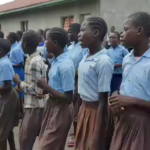
Emmanuel always wanted to work for his people but thought he needed a masters or a PhD to make a difference. He felt without it he was not good enough to make an impact. The training he has received at ARI has helped him envision himself as a leader. Like many successful men there is a strong woman at his side. In 2013 he sent his wife to ARI and together, they started the school for the village kids on the land they had purchased, and both the school and farm continue to grow. Last year they expanded to include the 8th grade class and 14 young men and women passed the challenging exams to go onto secondary school.
Emmanuel continues to invest in farming. He feels that the soil has taught him how to bring people together, and together they listen to the soil. Emmanuel has shared these dreams with people. The soil, he shares, has brought them peace. He is now able to pay his teachers salaries and keep the students fed. He continues to grow the vision of self-reliance and by sharing this vision of his community he was able to fund a bore hole which due to the depth of the water table, are very expensive.
I also recently attended an alumni meeting in Myanmar where we have over 90 graduate alumni. They are a diverse group of people, with diverse religious and ethnical backgrounds. They speak different local tribal languages, and come from different regions of the country, but they help each other like they are a part of the same family, One of the goals of the Myanmar family that ARI helped build is to stop slash and burn farming and move towards a more permaculture-based approach.
Is there a way people contribute to ARI?
People can contribute to the American Friends of ARI at the following website (http://www.friends-ari.org/). This is a US based support group but your friends from Canada and elsewhere in the world can find links to donate there. However a big part of ARI is volunteering. Anybody who is interested can volunteer and many stay for as long as a year. We know not everybody has that much time and people are welcome to come and volunteer for as long as they want.
How can people who strive to become community leaders obtain training at ARI?
We have a few requirements. You must be a part of an organization, a co-op or farmers group for example. It doesn’t have to be a big group and association with smaller groups is often better. You must also have demonstrated 3 years of community leadership. Examples of community leadership might be a pastor who works in the field or orphanage manager. We strive to be religiously diverse. Basic English skills and a high school education are also required. In some cases certain requirements are waived and our graduates often recommend people. There is an application process and participants are asked to contribute what they can to airfare. We feel it is important that participants invest something.
Is there anything you would like to ask or tell me?
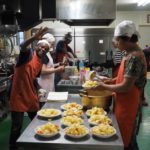
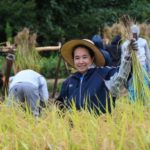
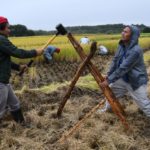 I have worked at ARI now for over a decade. For two hours a day everybody does food life work. We also eat and clean dishes together. When I am on that campus I have time to think about the important questions in life. What is self? What is community? What is giving? What is the appropriate amount of self sacrifice to better your community? Why does being part of a shared effort feel better than giving money?
I have worked at ARI now for over a decade. For two hours a day everybody does food life work. We also eat and clean dishes together. When I am on that campus I have time to think about the important questions in life. What is self? What is community? What is giving? What is the appropriate amount of self sacrifice to better your community? Why does being part of a shared effort feel better than giving money?
I noticed on your website you often spend a little time educating people about other cultures. In Japan, people think about how their actions and statements impact others more than other countries I have lived in. They are very considerate of others and when you go to an Izakaya, a drinking and eating place that serves small dishes, everybody shares food and nobody gets their own dish. Food goes down so slowly because everybody wants to be sure that everybody else gets to try it. The last piece often sits on the dish for a long time.
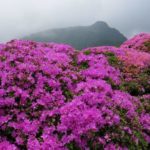
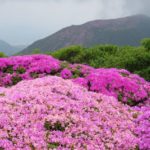 Ninety percent of the people in Japan live in cities and seventy percent of the country is mountains. There are beautiful forests and rivers. People love nature, hiking and mountain climbing. This is where I am able to communicate to the local people the best. People are shy here but after a couple of sentences they open up. I climbed a mountain a year ago last June. Grandmas and grandpas were slowly ascending the mountain with walking sticks. As I approached the top, all of the mountain tops were covered in Azaleas for as far as the eye could see. It brought a new meaning to the phrase “flower power”. The Azaleas were pulling these elderly people up the mountain.
Ninety percent of the people in Japan live in cities and seventy percent of the country is mountains. There are beautiful forests and rivers. People love nature, hiking and mountain climbing. This is where I am able to communicate to the local people the best. People are shy here but after a couple of sentences they open up. I climbed a mountain a year ago last June. Grandmas and grandpas were slowly ascending the mountain with walking sticks. As I approached the top, all of the mountain tops were covered in Azaleas for as far as the eye could see. It brought a new meaning to the phrase “flower power”. The Azaleas were pulling these elderly people up the mountain.
I also see you often ask people about how the world is changing. In 2011 the mega earthquake, the associated tsunami and the Fukushima nuclear disaster changed our lives. The ground shook for 5 minutes, standing on solid ground felt like standing in a boat on water. A number of the buildings on campus were damaged. There are 54 nuclear power plants in Japan and we are on the most seismically active island in the world. Nuclear power is a part of Japan’s response to the Koyoto accord and ARI is 100 km away from Fukushima. When the accident occurred, the media never used the world “meltdown”Normally these things are described as incidents. We didn’t know if 40 years of work building organic soils and the farm was finished. We have taken a lead in communicating radiation information and performed careful measurements at the same point for 9 years. Many people seem to have forgotten about the disaster. Fortunately the contamination level here at ARI is low. I wish we were less reliant on nuclear energy. I met the mayor of my town of Beppu once and told him my dream was that the entire city was powered using geothermal energy. He replied, “Mine too.” Japan is a country with big visions, a lot of science knowledge and community spirit so a lot could change in an instant – potentially
If people are interested in learning more about the communities ARI has helped you can watch videos or read stories on the website (www.ari-edu.org). If you prefer something more tangible on the website you can find a link to purchase the book “Rural Leaders. The Work and Community Impact of Graduates of the Asian Rural Institute.” Funds from this purchase go to support the program.
I do have one question for you Matt. You talk a lot about community on this website. What do you think is your community?
I grew up in America with a Canadian mother. She grew up on a farm and her practical approach to life provided a strong influence on who I have become. I view myself as a Canadian American, but that does not answer Steven’s question. A more appropriate answer is that I feel that your community is wherever you are. Your surroundings are influenced by your actions and any place you are is what you make of it. I love almost every place I have visited, and more often than not I find myself thinking I should move to where I am. As I reflect upon my time in the megalopolis of Los Angeles I find that it was not a place I would choose to live again. The mountains surrounding it and the oceans were beautiful but the traffic, the polluted skies and never ending city was something that detracted from what I feel is important to me to being human.
Another question I often get asked is, “What are you doing for your community?” If I assume my current community is the Praia da Vitória I can reflect upon the plastics and styrofoam I pulled from the ocean and its beaches. When cases of Covid 19 began to surface I volunteered my services as a biosafety level 3 trained scientist with experience in viral diagnostics to the local officials. Being alone on a boat also is a place that allows ample time to ponder what is giving and what is community and an appropriate level of self sacrifice and giving.
Here in the Azores I am worried about how the lack of tourism will impact all the people who rely on it to provide for their families and have tried to share with people how stunningly beautiful, affordable and friendly this place is. I also still love my country and the political divide in America and lack of ability for Americans to listen and learn from each other weighs heavily upon my mind.
As I reflect upon my response to Steven’s words, I think of the terra firma based community farm of 30 people working together to create meals and solo isolation bobbing slowly back and forth alone on a boat as being dramatically different environments. Yet both Steven and I find time to reflect upon how we can improve our communities. Important questions that feed the soul. One thing that has always bothered me about returning to the States is how easily I get caught up in the rat race and how little I reflect upon these types of topics. I have never really been able to determine why that is, especially since I avoid TV, but it certainly does not do our species justice. As I finish this article, by chance a Bob Marley song plays over my online radio station. These words are part of the song, “Oh it’s a disgrace, to see the human race, in a rat race.” It certainly seems true and that we as a species are capable of much greater things.